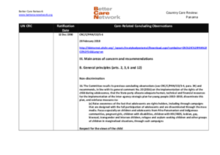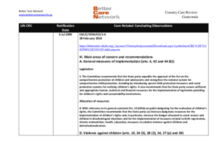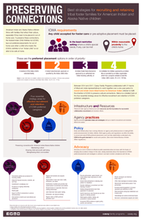This page contains documents and other resources related to children's care in the Americas. Browse resources by region, country, or category.
Displaying 1971 - 1980 of 3191
Child welfare agencies are tasked with investigating allegations of child maltreatment and intervening when necessary. Researchers are turning to the field of predictive analytics to optimize data analysis and data-driven decision making. This paper examines the utility of statistical algorithms in predictive analytics.
This country care review includes the care-related Concluding Observations adopted by the Committee on the Rights of the Child and the Committee on the Rights of Persons with Disabilities.
This country care review includes the care related Concluding Observations adopted by the Committee on the Rights of Persons with Disabilities and the Committee on the Right of the Child at their recent examinations of Guatemala's report.
This brief guide from Casey Family Programs lays out strategies for recruiting and retaining tribal foster families for American Indian and Alaska Native children, ensuring that indigenous children can stay in their communities.
The American Civil Liberties Union (ACLU) has filed a lawsuit in US district court against federal immigration agencies that have separated a Congolese woman, given the pseudonym "Ms L" in court documents, and her daughter, according to this article from the Guardian.
According to this article, and radio segment, from NPR, there are about 1,200 children on the Navajo indigenous reservation in the US who cycle in and out of foster care each year, but only 26 registered foster care homes.
This study examined the extent to which (a) maltreatment type and (b) foster care placement were associated with the educational attainment of 337 maltreated adolescents.
The authors of this study sought to better understand the potential strengths and challenges of medical foster care (MFC) as a placement setting for children with chronic critical illness (CCI).
This study uses data from the provincially representative Ontario Incidence Study of Reported Child Abuse and Neglect (OIS-2013) to identify the characteristics of the alleged maltreatment, functioning concerns, caregiver risk factors, and socioeconomic conditions associated with the decision to provide ongoing child welfare services to adolescents and their families.
The current study presents findings from a survey of child welfare caseworkers' experiences with reunifications and focuses on practices and key factors at the casework practice and at the system-environment level to assist in achieving successful reunification.




